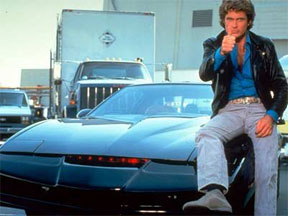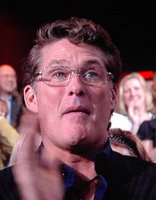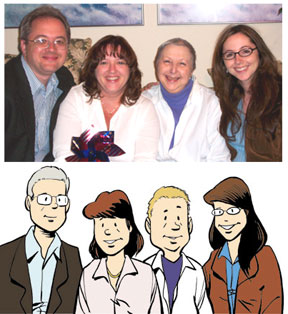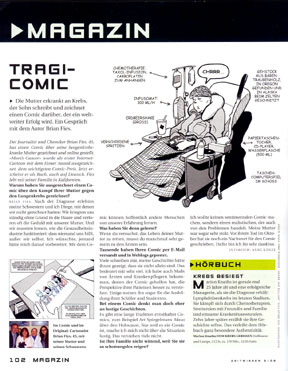Friday, June 30, 2006
A Tart Interview
Writer MK Czerwiec has posted a new interview with me in the Tart's July issue and I think it's great. MK's experience as a former cancer nurse gives her unique expertise and perspective, I think, which makes me value her opinion all the more. She asked questions I don't think I'd been asked before and I really enjoyed corresponding with her.
As I post this, I see that the interview cuts off in mid-sentence. I assume that's an Internet or coding glitch they'll iron out soon (if the last words you read are "...commitment to be a," come back later for the rest).
Thanks, MK, I'm grateful.
Thursday, June 29, 2006
Even More Things Considered
As I mentioned, at least 45 minutes of interview were distilled into the "All Things Considered" piece. It's interesting to hear what they chose and how they put it together. Some of my quotes were seamlessly assembled from longer quotes. Big sentences got condensed into little ones. In one case, they saved me from embarrassment when I mis-read from my own book. I'm not complaining I was misquoted; I can tell that most of the edits were done to streamline stories or omit details Melissa Block and her producer thought were extraneous. My meaning was represented faithfully, if abbreviated. I'm just fascinated by the process.
I wish NPR had picked different samples from my book to accompany their Web posting. They chose four panels from Mom's Cancer in which I rail angrily at weak, selfish smokers who deserve whatever they get (the same sequence Melissa asked me about in the interview). I'll stand behind the truth of those panels but they're not representative of the rest of the book. Nor, frankly, are they a very attractive inducement that'd make someone want to rush right out and buy it.
But no complaints. I'm not ungrateful. It was a great experience, hits on my website and blog are soaring, and I appreciate the opportunity. Mom would have loved it.
More Things Considered
Of course it'll be edited to a much shorter piece (I don't know how short) and, depending on which few minutes of our conversation Melissa and her producer pick, we'll either sound like the most talented, compassionate, funny and wise people you'd ever want to meet or complete twits. Thinking back, I'm only wincing at one or two things I said, which is a pretty good average for me.
They couldn't tell us when it would run--either today or tomorrow, I think. Melissa promised that her producer would call when they knew, and I will update this post when I find out. Meanwhile, here's Miriam and me in the studio, photo courtesy of sound engineer Howie, who was a friend of Miriam's and a great guy.

The best part was getting to know Miriam. I think we had a good rapport both off and on the air. If we worked up an act, we could take it on the road.
UPDATE: We're on today! The time will depend on when your local NPR station plays "All Things Considered." It's a two-hour program, and I understand from the producer that we'll be on at 10 minutes before the end of the first hour. So if "All Things Considered" starts at 5:00 p.m. in your market, we're scheduled to be on at 5:50 p.m. No promises.
Wednesday, June 28, 2006
All Things Considered
This is another big deal and another first for me.
Among the things I don't know: how long the interview will go, what we'll talk about, how it'll be edited, and when it'll run (tomorrow, I guess, but I'm not certain). Since we're meeting in the morning and "All Things Considered" is broadcast in the late afternoon whenever I've heard it, I assume we're not live but I don't even know that for sure. As they say, check your local listings. I'm comfortable playing it by ear.
I had the pleasure of meeting Miriam Engelberg in person last night. We've exchanged a few e-mails in the past and she conveniently had a book signing less than an hour from my home, so I thought I'd go watch her work and steal ideas. She gave a good, funny talk and invited me to spend tonight on her futon before our radio
appearance--one of the nicest offers anyone's made to me in a long time, although I didn't take her up on it.
I'll let you know how it goes.
Monday, June 26, 2006
Final Comic-Con Plans
Comic-Con International
July 20-23, 2006
San Diego, California
- Thursday, July 20, 5 p.m., Room 1B:Spotlight on Brian Fies. An hour of solopsistic self-absorption that I'll make as interesting as I can.
- Thursday, July 20, 6 p.m., Room 3: Developing Your Webcomic. I will be one of several people in this panel discussion, which is part of Comic-Con's three-day "Webcomic School."
- Saturday, July 22, 10:30 a.m., Room 2: What Is Mainstream? A panel discussion about how the definition of mainstream comics literature is evolving in the market. Or something like that.
I'll also be signing books at the Harry N. Abrams booth at every opportunity. Don't know where it is yet, but I'm sure we'll be listed in the program.
Hi, Larry.
Friday, June 23, 2006
Unsolicited Testimonials
I've been very busy with a couple of big work deadlines lately and apologize for my dearth of postings. Not much is new in bookland, I'm just looking forward to an interview I expect to show up on the Sequential Tart website next week and preparing for Comic-Con next month.
And Happy Birthday to Kid Sis, Nurse Sis, and my wife, whose birthdays all fall within the last week of June. Or, as I call it, Hell Week.
* Powerpuff Girls excepted.
** That is, the cat barfs many times a week, not me.
*** If you know what I mean.
Tuesday, June 20, 2006
Monday, June 19, 2006
San Diego Comic-Con Schedule
Thursday, July 20, 5 p.m.: Spotlight on Brian Fies. This will be 50 minutes for, by, and about me during which I can talk about anything I want. Mostly me, I gather. I'm working on a presentation that I hope will be interesting and non-drowsy. There will be no karaoke, which I hope will be sufficient incentive to attend because I'm not sure what else I can offer.
Thursday, July 20, 6 p.m.: Immediately afterward, I will dash across the hallway to be part of a panel discussion on "Developing Your Webcomic," part of a three-day Comic-Con series on Webcomics. I'm not sure who else is participating but I have some thoughts on the panel topic and hope to contribute. I'm sure I'll learn much more than I can teach.
My publisher Abrams will be staffing a table on the boundless convention floor this year, packed with a great assortment of artfully produced comics-themed publications. I'm sure I'll schedule many book-signing opportunities at that table but mostly look forward to just wandering about as a fan.
The San Diego Comic-Con is truly a staggering collection of comic book, comic strip, science fiction, gaming, movie, and any other kind of genre-related people you can imagine. You will either feel like you have fallen into the warm embrace of others who finally understand you, or you will wonder whether something has gone dreadfully wrong with the human race. Or both. And if you don't already have a hotel room and parking space reserved, it's way too late to think about going.
I was extraordinarily happy and proud that Mom's Cancer won an Eisner Award for Best Digital Comic last year (if you're interested in how that went, I wrote about it here), and am very flattered they asked me back as a special guest this year. It's an honor. I'll try to do a good job.
Friday, June 16, 2006
The Art of the Interview
I worked as a newspaper reporter a long time ago and have since interviewed more people and written more articles than I can recall. (That's literally true; I'll often find published work of mine just a few months old and have no memory of writing it. Maybe I should see a doctor.) There are a lot of ways to do an interview, each with their pros and cons, each yielding different effects and results.
The old-fashioned way is to sit down with a subject face-to-face with a notepad. One of the pros of this method is that you actually meet the person, ideally in their own environment, and the interview can be more of a conversation that meanders in interesting, insightful directions. One of my favorite examples was a retiring school teacher I interviewed for a newspaper feature. When I entered her living room I saw that she'd installed built-in custom-made racks filled floor-to-ceiling with magazines on a wide array of interests from around the world. That was my key into the lady's career and personality right there.
One of the cons of this method is that very few reporters write as fast as a subject speaks. You can miss a lot. When I do a face-to-face interview I prefer to use a tape recorder backed up by notetaking, but that has some drawbacks, too. First, you have to trust the technology. It doesn't happen often, but I have lost entire interviews to bad batteries. Second, you've got to transcribe the darned thing later, which takes a long time. Third, a tape recorder really makes some people nervous. Fourth, there seems to be an old-school journalism ethic against taping, like that's not what real reporters do. I never understood that, and maybe some of the more experienced journalists who read my blog (I know who you are!) can explain it or correct me if I've got the wrong impression.
An alternative to a face-to-face interview is a phone interview, usually the most practical option. You lose some personal connection and whatever first-hand observations you might make about a person and their environment, but you gain a lot of efficiency. It's also easier to tape a subject (with their permission) via phone without throwing them off their stride. For most purposes, a phone interview is just fine.
Today's Newsarama interview was done by phone. In fact, as best as I can recall, it's a pretty straight transcript of our conversation ... which illustrates one of the hazards of the oral interview: no one speaks in neat sentences and paragraphs. Everyone talks in fragments and run-ons with dicey grammar and misfired vocabulary. Thoughts wander. When you see someone quoted in the newspaper, unless they were reading from a prepared speech, that's the cleaned-up version with all the "uhs" and "y'knows" snipped. You're not trying to make someone sound better, just comprehensible.
More and more interviews are done via e-mail and are often published in a Question and Answer format. After the writer thinks up their questions, their job is pretty much done and the answers are almost irrelevant. Although these writers often ask if I'm available for follow-up questions and I always am, in practice no one has ever followed up.
The con of this method is that there's almost no give and take. Everything depends on the quality of the initial questions. The interview never goes in unexpected directions. There's nothing for a writer to observe themselves, as even a phone interview can sometimes tell you something about a subject they didn't intend to convey. I think that's a pity. However, e-mail interviews have several pros. They're very time-flexible. If the writer knows the information they're looking for, it's a direct way to get answers. Subjects can think about their reply and say exactly what they want how they want. Like many people, I write better and smarter than I speak. And there's almost no danger of being misquoted or taken out of context.
As a writer, I don't think anything beats meeting a subject face-to-face on their home turf, preferably with a notepad and tape recorder. I figure my job isn't just to write down what people want to tell me, but to observe things they don't realize they're revealing and maybe coax them into saying things they weren't planning to say.
As a practical matter, the phone interview is my favorite "go-to" tool. Frankly, unless you're doing a real in-depth feature, the phone is a great way to get the facts and quotes you need while still having some personal interaction that allows for spontaneity.
But as a subject, I must admit I really enjoy the e-mail interview, which gives me total control over its content and lets me sound as smart as possible. Pros and cons, different methods and results.
Wednesday, June 14, 2006
Mutter Hat Krebs

I was very happy to see that the book's production and print quality look every bit as good as they did in the English-language edition. The German publisher, Knesebeck, made an odd choice to use a reddish-brown cloth on the spine instead of the original blue-black. I can live with that. The fun part is picking through the pages with my high-school German and seeing the choices they made in translating my colloquial American. Some are pretty interesting.
Did you know that American snoring goes "Zzzz" while German snoring goes "Chrrr"? Me neither.
Anyway, my compliments to whoever was in charge of quality control (it wasn't me) because I think the German version turned out great. My foreign language collection has begun.
Tuesday, June 13, 2006
Medical Humanities Review
Ms. Day recently wrote a review of Mom's Cancer and, as self-serving as it may sound for me to say I found it to be extraordinarily perceptive, I nevertheless did. Of course I'm happy she wrote nice things, but she also picked up on details most readers miss. Her review concludes:
Mom’s Cancer is an inspirational work of great love and care. In spite of its serious subject matter, this is not a pathos-saturated book. Fies’s ability to universalise his particular and personal situation affords an authentic, original insight into the realities of coping with serious illness.
Aside from people who've been through the cancer mill themselves, no one's opinion means more to me than that of educators and medical professionals who deal with these issues every day. I didn't expect my book to strike a chord with everyone--no book does--but mine is getting great responses from all the right people. Many thanks to her.
Monday, June 12, 2006
MSNBC Review

Reader Louie left a comment alerting me to a new review on MSNBC.com dated June 9. I didn't know about it, thanks Louie.
Reviewer Gael Fashingbauer Cooper summarizes Mom's Cancer and writes, "Many readers won't be able to get past the title, and even if the book rings true, it's not exactly a cheery gift--although it should become required reading in medical schools. But those who do pick it up will find it a brave and honest tale. Meeting 'Mom' and her family will help you appreciate and understand your own."
Cooper also notes that Mom's Cancer "may be a hard book to market." I suspect that is more true than I anticipated.
Thursday, June 08, 2006
Congrats to the Class of Ought-Six

I remember when they were that old and we did the math, and the idea of them graduating in the Class of 2006 sounded as distant and futuristic as lunar colonies. Of course my girls eventually grew hair, and looked something like this when I snuck them into Page 82 of Mom's Cancer:

When I was 18, I wondered why everyone made such a fuss about graduation. It really seemed like the slightest of accomplishments to me--just put in your time and they give you a diploma (though I understand and respect that it's not that easy for everyone)--and I perceive the same annoyed vibe from my girls. "What's the big deal and why does everyone keep asking me how I feel about it?" I get that.
At the same time, looking back from across the generation chasm.... Man! That paper is inked in hard work, pride, disappointment, friends, adulthood, independence, the beginning of an exciting but frightening future. Also undeniably my own middle age, my wife and I looking at each other across the table and asking, "All right, that went better than expected, now what?" A parent might understand, although a kid would not, why I get a little weepy when I find a ream of three-ring-binder filler paper that'll never be used. Graduation encompasses a lot.
I was wrong when I was 18. It's a big deal. For now, my girls will just have to accept my word for it. And my congratulations.
Tuesday, June 06, 2006
University Researcher Still Wants You
She posted a comment on my June 1 entry saying that she's still looking for interested people to take a survey about how they use the Internet. For more information, visit her site at https://wintis.mowsey.org/survey/. If you've got a few minutes, I think it'd be cool to help her out.
Monday, June 05, 2006
Why Babelfish Needs a Hebrew Translator
This is the kind of thing that completely astounds me when I spend more than a few seconds thinking about it. Right now, on the other side of the world, people I'll never know are reading my family's story in a language I can't understand. Some of them are visiting my website and this blog. (Hello and thank you!) We are connecting at the speed of electrons.
Amazing.
Sunday, June 04, 2006
Three Things I Have in Common with David Hasselhoff
2. I have a car that is smarter than I am, just like David Hasselhoff. (Mine doesn't talk to me, but it does have a computer onboard and definitely ... knows things.)

3. I wept like a little baby girl when Taylor Hicks won American Idol. Just like David Hasselhoff.

Thursday, June 01, 2006
Character Design
As I prepared to do Mom's Cancer, I put a lot of thought into what the characters would look like. Making them exact likenesses of my family was not my top priority, which is one reason Editor Charlie and I decided not to publish a photo in the book: as cartoon characters, we're abstract stand-ins for the reader rather than concrete, specific people. Also, we didn't want to pull readers out of the story by giving them a reason to flip back and forth comparing the drawings with reality. But for today's purposes, here's a side-by-side:

Mom’s Cancer took more than a year to draw and I wanted my characters to be recognizable and consistent from the beginning of the story to the end. I sat down beforehand to make sure I understood the fundamental shapes underlying my characters, could move them around in space and make them work from every angle, etc. I didn't spend a lot of time on it and wasn’t trying to accomplish anything more profound than come up with characters who could do everything I wanted and express every emotion I needed, and that I could stand to draw over and over again.
Mostly, I tried to apply some basic cartooning principles to help the reader subconsciously know my characters before they opened their mouths. In Mom’s Cancer, the characters of Nurse Sis and I are in our forties while Kid Sis is about thirty. Nurse Sis and I therefore have stockier necks, rounder faces, thicker body shapes, and more often than not a bag under an eye. Nurse Sis is a take-charge person who leans forward and leads. My character is more passive and reflective, leaning back. In contrast, Kid Sis is more angular and attractive, with a thinner neck, smaller nose, bigger smile, and better posture.
Of all my characters, Mom is the one that looks least like her real-world counterpart. The Mom character is in her sixties, sick, and tired. Both her head and body are pear-shaped, her posture is poor. Gravity is dragging her down. She has no neck, her eyes are baggy. When she had hair, I drew it with a lot of waves and points that would contrast with her smooth bald head later. Her striped shirt gave me something graphically interesting to play with that stood out against both white and black backgrounds, while her black pants were a negative space I knew I could use effectively once in a while. I was much less interested in creating a character who looked like my mother than one who could help me tell the story.
Despite my initial groundwork, I found that the look of my characters gradually evolved over the course of drawing them dozens of times over several months. That's pretty common for comics characters: Snoopy changed a lot between 1955 and 1995. I actually had to go back and redraw Mom in particular as she became quite unrecognizable. The “Moms” in about the first 20 pages of my book are all paste-up corrections inserted much later because the way I drew her character changed as I grew more comfortable with it and demanded more of it.

Mom's evolution, pre- and post-paste-up.
I consider that design evolution an interesting failure on my part. If I had put a little more thought into what I expected of the character at the start, I might have been able to design her to hold up better in the long run.
And though I wasn't necessarily aiming for photorealistic accuracy, at least I was honest about my gray hair.

